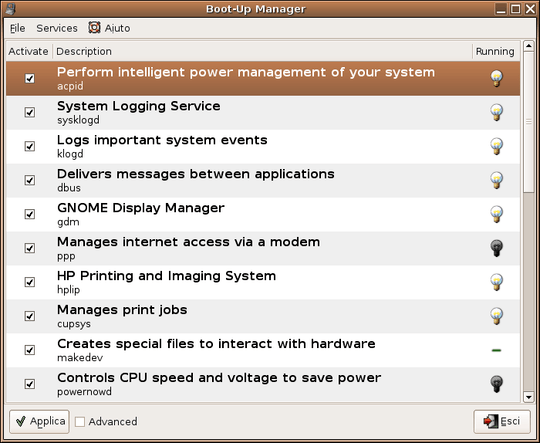44
19
I have lots of servers installed (Apache, MySQL, etc.), but I don't want them all to start at boot time (they drain power, and I'm on batteries most of the time). How do I configure this?
44
19
I have lots of servers installed (Apache, MySQL, etc.), but I don't want them all to start at boot time (they drain power, and I'm on batteries most of the time). How do I configure this?
55
In the console, you could write:
sudo update-rc.d -f apache2 remove
sudo update-rc.d -f mysql remove
...
For additional information read Ubuntu Bootup How to.
11
Things have changed quite a bit in Ubuntu now. I think from version 11 onwards. MySQL is handled by Upstart while Apache still uses traditional SysV init scripts
For MySQL, you can use the new override feature in Upstart to modify the starting behaviour:
sudo echo "manual" >> /etc/init/mysql.override
For more info, see the section "Disabling a Job from Automatically Starting" in the Upstart Cookbook.
As Apache still uses the traditional SysV init scripts you can use
sudo update-rc.d -f apache2 remove
to remove the links from /etc/rcX.d or, alternatively use
sudo update-rc.d apache2 disable
which "disables" the script by changing it from a start script to a stop script. This is reversible by
sudo update-rc.d apache2 enable
Most of this information I got from here: https://askubuntu.com/a/40077/24678
5
This link is a bit out dated version wise, but does it match an option in your version?
Configure startup services
This requires administrative privileges (see Chapter 2, Administrative Tasks).
- Run Services Settings: System → Administration → Services.
- Enter your password.
- Select the services you want running, then click OK when done.
4
You can use Boot-Up Manager for start and stop boot-up scripts, without the necessity to handle thru complex links and permissions.
apt-get install bum

3
Another way to accomplish this is to 'disable' the sym link - not delete it.
sudo update-rc.d mysql disable 2
This will rename the sym link to start with 'K' and the service won't start-up on boot. You can then re-enable it at any time if you do decide you want it to start-up on boot.
2
On Ubuntu 16:
sudo systemctl disable mysql
update-rc.d method wasn't working for me.
Upstart has been deprecated in Ubuntu 15.
I get "bash: /etc/init/mysql.override: Permission denied" when run "sudo echo "manual" >> /etc/init/mysql.override" in Ubuntu 14.04. – Hung Tran – 2015-03-24T02:48:10.993
1@HungTran - As superuser, try creating the file /etc/init/mysql.override with an editor - with contents containing the word manual – Wavesailor – 2015-04-08T13:55:56.647